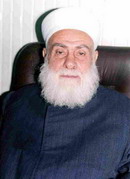
“God does not take away knowledge by stripping it from the breasts of men. Instead, He takes it away by taking away the scholars in death. Until there no longer remain scholars; and people take the ignorant as their leaders. They are asked, and they proceed to answer despite not having knowledge. They are misguided and they misguide others.” –Prophet Mohammed
It is the way of great men to travel on and leave behind gaps that cannot be filled. The Muslim world is currently experiencing the emptiness of such a gap. Sheikh Muhammad Adib Kallas died this week in Damascus. He was a master of theology and a jurist par excellence. Moreover, he was an example of a sage who inherited not just his knowledge, but his character, from the Prophet Mohammed through an unbroken chain of transmission.
Not only was he erudite and sharp-witted – he continued to read logic with students throughout his final illness just to keep his mind nimble – but he was exceedingly gentle. He was dedicated to both his students and his family, loved them dearly, and nurtured them. Tenderness and sagacity, that is how I remember Sheikh Adib. It is well known that he is the one who teaches ambitious students of knowledge in Damascus to say: “I don’t know.”
Born in 1921 in the heart of Old Damascus, in the shade of the Omayyad Mosque, Sheikh Adib began his pursuit of sacred knowledge in the early post-Ottoman period of the 1930s. He was understudy to some of the greatest names in recent Damascene history. He imbibed knowledge from them while learning was still organic in the Muslim World, well before it would become tainted by modernist reactionism. Between him and the Prophet Mohammed were only 18 masters.
Later, when the Soviets sent their atheist conundrums to Damascus, government ministries would forward the challenges to Sheikh Adib, who would, in turn, make short order of them.
He was courageous and humble all in the same moment, and inspired confidence as well as an ethical approach to law in his students and colleagues alike.
The scholars of Islam who have taken their knowledge in this way have a balancing effect on society. They combine a grounding in the authentic cultural identity of their people with a deep-seated sensitivity to the human condition and the well-being of community.
Their learning is beyond reproach, operating in accordance with systematic intellectual principles, wholesome spirituality, and lofty aims and purposes. The purposes that guide them are the preservation of life, intellect, religion, human dignity, and private property, as delineated by the Andalusian al Shatibi and al Ghazali before him. These men inspire our citizenry to be ethical human beings who combine education with compassion.
It is my contention that the sustainability of wholesome and balanced society is contingent on our ability to maintain the organic methods of learning and spiritual development that these men continue to leave behind them.
By Jihad Hashim Brown, director of research at the Tabah Foundation. He delivers the Friday sermon at the Maryam bint Sultan Mosque in Abu Dhabi
It is the way of great men to travel on and leave behind gaps that cannot be filled. The Muslim world is currently experiencing the emptiness of such a gap. Sheikh Muhammad Adib Kallas died this week in Damascus. He was a master of theology and a jurist par excellence. Moreover, he was an example of a sage who inherited not just his knowledge, but his character, from the Prophet Mohammed through an unbroken chain of transmission.
Not only was he erudite and sharp-witted – he continued to read logic with students throughout his final illness just to keep his mind nimble – but he was exceedingly gentle. He was dedicated to both his students and his family, loved them dearly, and nurtured them. Tenderness and sagacity, that is how I remember Sheikh Adib. It is well known that he is the one who teaches ambitious students of knowledge in Damascus to say: “I don’t know.”
Born in 1921 in the heart of Old Damascus, in the shade of the Omayyad Mosque, Sheikh Adib began his pursuit of sacred knowledge in the early post-Ottoman period of the 1930s. He was understudy to some of the greatest names in recent Damascene history. He imbibed knowledge from them while learning was still organic in the Muslim World, well before it would become tainted by modernist reactionism. Between him and the Prophet Mohammed were only 18 masters.
Later, when the Soviets sent their atheist conundrums to Damascus, government ministries would forward the challenges to Sheikh Adib, who would, in turn, make short order of them.
He was courageous and humble all in the same moment, and inspired confidence as well as an ethical approach to law in his students and colleagues alike.
The scholars of Islam who have taken their knowledge in this way have a balancing effect on society. They combine a grounding in the authentic cultural identity of their people with a deep-seated sensitivity to the human condition and the well-being of community.
Their learning is beyond reproach, operating in accordance with systematic intellectual principles, wholesome spirituality, and lofty aims and purposes. The purposes that guide them are the preservation of life, intellect, religion, human dignity, and private property, as delineated by the Andalusian al Shatibi and al Ghazali before him. These men inspire our citizenry to be ethical human beings who combine education with compassion.
It is my contention that the sustainability of wholesome and balanced society is contingent on our ability to maintain the organic methods of learning and spiritual development that these men continue to leave behind them.
By Jihad Hashim Brown, director of research at the Tabah Foundation. He delivers the Friday sermon at the Maryam bint Sultan Mosque in Abu Dhabi
No comments:
Post a Comment